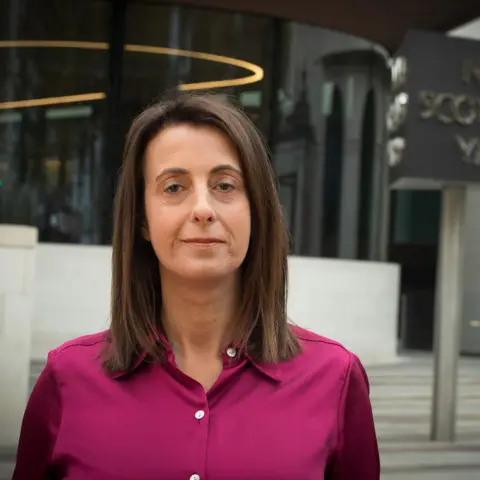[ad_1]
 BBC
BBCThis story contains detailed descriptions of offensive sexual acts.
It started with a phone call.
Late at night in October 2022, my mobile lit up with a withheld number.
There was a man at the other end of the call, a voice – and then he started making noises.
Without a doubt, this stranger was masturbating down the phone.
The noises got louder and louder. My heart raced, struggling to believe what I’d just heard. I hung up. But the phone rang again and again.
At this point, I switched into journalist mode.
I knew this man needed to be reported and I was sure the police could trace the call – but they’d need evidence.
So I ran upstairs and grabbed my work phone. On his third or fourth attempt to call back I picked up the call and put it on speakerphone, and recorded him.
For five minutes I listened and recorded as he masturbated, calling out my first name, using vulgar language to say “suck my [penis]” and making other obscene and lewd comments about my genitalia. I wondered when he would have had enough and when I would have enough evidence.
I was concerned about my personal safety: if this man knew my first name and number, did he know me? Had I met him? Was it someone I’d interviewed? Did he know where I lived?
He had an accent I didn’t recognise, maybe Midlands. I assumed it was in some way connected to the fact I was an on-air BBC journalist but I wasn’t sure. I dialled 999 to report the crime.
The following day I went to my local police station to give a statement and was asked to upload the taped recording onto the Metropolitan Police’s system.
I was naively hopeful they could use it to quickly trace the caller and arrest the man.
I’ve worked on too many stories of violence against women – including the disappearance and subsequent rape and murder of Sarah Everard.
Police had failed to investigate Wayne Couzens for at least three indecent exposure offences before he murdered Sarah Everard. Experts say those offences may have been a “red flag” that someone could go onto more serious offending.
So I had two concerns: my own safety and making sure this man couldn’t go on to commit more serious sexual offences.
The whole ordeal would turn out to be an eye-opening experience into why so many sexual offences go unreported or unpunished, how slow the police and justice system move and how despite the warm words, women are still being failed, due to police incompetence.
Police actually dropped my case and only reopened after a Victims’ Right to Review was carried out.
He was eventually charged – but he wouldn’t have been if I hadn’t taken control of it.
To make matters worse, three days ago I found out he’d actually been convicted in 2015 for making 15,000 calls to random numbers – raising even more questions about why it took so long to get him charged now.
The Met Police admitted their handling of the case “clearly fell short”.
Lancashire Police said their initial handling “did not meet the standard expected”.
Here’s how it unfolded.
October 2022: The first misstep
Two days after making my statement, a police officer told me to ask my phone provider to investigate the withheld number.
But EE was clear this request should come from the Met – not the victim.
After returning from leave, the officer replied: “Apologies, I was obviously working on old information regarding withheld numbers. Sorry to have wasted your time on that.”
But the Met request needed to go through “a few levels of authorisation”, which “can be slow as it is prioritised according to risk and offence”.
At the same time, I was trying to think who could have got my number. It started making me suspicious of everyone.
Coincidentally, I was speaking to Met commissioner Sir Mark Rowley the next day about the interim Casey report, commissioned after Sarah Everard’s murder, which dealt with the force’s institutional problems.
As each day passed, I feared my offender could go on to sexually assault someone. I wanted to do everything in my power to make sure that wouldn’t happen.
Two days on, the local officer emailed to say tracing the phone number was proving too time-consuming. The Criminal Investigation Department (CID) was going to take over.
CID told me there was “very little reasonable line of enquiry to pursue considering the number used was withheld.”
They asked me if I’d sent in the recording. Despite the fact I’d sent it, CID had failed to find it on their system.
They also said they’d check with the original officer if they’d approached EE to identify the withheld number – they hadn’t.
December 2022: A breakthrough
Two months after the incident there was positive news – they’d managed to identify the withheld number and were now seeing if they could track down the person connected to it.
And then a breakthrough: the officer identified the suspect through the Police National Computer.
He was in the Lancashire area – so Lancashire Police took over the case.
January 2023: ‘No need to arrest’
I emailed Lancashire Police saying I supported a prosecution – but they didn’t answer.
Eventually an officer replied saying he had no information about the case other than the crime reference number and a basic description.
Why hadn’t the Met passed on the information? They told me it was the Lancashire officer’s job to request it. I relayed that information to him.
A week later there seemed to be some progress. The officer had visited the home of the suspect, who hadn’t opened the door.
He said he would go around again that evening. But I was told there was no need to arrest him at the moment as he didn’t meet the custody threshold.
February 2023: Arrested and bailed
In court I watched as Wayne Couzens pleaded guilty to three offences of indecent exposure, one just days before he raped and murdered Sarah Everard.
The police were heavily criticised for their failure to deal with these incidents, which could have identified him as a sex offender. It gave me renewed drive to pursue my case.
It had been two months since a suspect had been identified – but I’d heard nothing from Lancashire Police. So I pushed them again.
A few days later, the officer apologised for the delay, saying he’d been on leave and then had Covid.
He said another attempt to contact the suspect had been unsuccessful and “at this moment in time I still have no necessity to arrest and the original plan of a voluntary interview is still in place.“
I asked why there was no need to arrest – especially as I was concerned this kind of crime could be a “gateway crime” to more serious offences.
This appeared to have an effect. Two days later I was told they’d now try to arrest the suspect due his non-compliance to be interviewed.
A day later what felt like a breakthrough text arrived: “We have forced entry and he has now been arrested.” Finally, they’d now interview him and go through his phone records.
But even that didn’t get me anywhere.
Although the police said the arrested man sounded exactly like the man I’d recorded on the phone, he’d denied calling me and said he’d lost his phone.
The officer believed the suspect was lying – but that his defence would make it hard to charge him.
He was bailed on the condition he didn’t contact me.
Deeply frustrated, I asked for a call with a senior officer.
I was worried that because of the number of times the police had been to his house, telling neighbours they were looking for him – he would have had time to get rid of the phone.
The sergeant told me that without the actual phone they’d struggle to make progress.
March 2023: No further action… then a U-turn
The police told me they were going through the suspect’s current phone – which he claimed was separate to the one that was “lost”.
Unsurprisingly, they couldn’t find anything on it.
They said they couldn’t charge him and they were going to close the investigation with no further action.
I was furious – they had the audio recording and they’d matched the phone number to the suspect. I felt their actions had given him the chance to get rid of the phone.
I told them I wouldn’t accept that decision and would appeal against it, but in truth I wasn’t sure how to do that.
At the end of the month a detective sergeant called.
He said they’d effectively carried out a Victims’ Right to Review on my behalf – as I’d mentioned appealing.
This gives victims the right to a review when unhappy with a police decision not to charge, after a suspect has been interviewed under caution. It’s different from the CPS scheme to challenge prosecutors’ decisions.
But I wondered: why didn’t they initially arrest the suspect? Hadn’t the suspect been given a chance to get rid of the phone?
“Arguably, yes, there might have been a need to arrest,” the detective sergeant admitted.
But he assured me there was still a prospect of charging the man.
I told him about my unsatisfactory experience so far.
“I can totally understand and sympathise with that,” he said. “All I can do is apologise on behalf of Lancashire Constabulary.” Finally, some accountability.
As this happened, I was reporting on plans to allow crime victims to be kept informed about their cases and challenge decisions.
The irony wasn’t lost on me as I headed into six months since my incident, having to fight at every moment to keep it on track.

If you’ve been affected by the issues in this story, help and support is available via the BBC Action Line.

April 2023: ‘Suspect was lying’
A step forward.
The Lancashire constable called me and said: “the suspect was lying.”
New checks on his phone had found it was indeed used to make the call – but using a different SIM card, which my number was on. The calls were traced to a phone mast near him.
The suspect would be rearrested as he had made multiple calls.
They didn’t believe he had specifically targeted me. Instead, they think he had been trying different numbers and knew my first name after hearing it on my voicemail.
But even after this – I heard nothing all through May and into June.
June 2023: ‘No urgency’
Two months had passed and there had been zero contact from the police. I texted the constable.
“This is getting a bit ridiculous now. There seems to be no urgency.” He insisted there was, and that further phone checks were taking time.
I requested a call with the detective sergeant. “You had this new evidence two months ago, you thought it was significant and yet the suspect hasn’t been brought back in,” I said.
He promised to find out why. “I can only apologise that it’s not going as quickly as it should be,” he replied. “I’m frustrated … it seems to have stalled again.”
July 2023: Arrested again
Finally the suspect was rearrested and interviewed but he still claimed he’d lost his phone and answered “no comment” when the new evidence was put to him.
The constable said the evidence would now go to prosecutors but that it was looking hopeful.
In the end, it took until November for it to be sent to prosecutors.
December 2023: ‘We got there in the end’
Finally, more than a year after the crime was reported, the constable told me the suspect would be charged with an offence of malicious communications by sending an offensive, indecent or threatening message.
“Apologies it’s dragged on, but we got there in the end,” he said.
In light of this, I decided to find out how many times the police Victims’ Right to Review had been used and granted.
Twenty-nine police forces across England and Wales responded to my question, but couldn’t provide data across the same dates.
Since 2015, at least 14,448 requests for police to reconsider not charging someone have been made – and 8714 were granted, around three in five cases
- The Met Police provided figures from 2021. They had 2,300 requests to review their decisions, and agreed to review more than 1,200 (55% of cases)
- West Midlands Police had more than 1,200 requests, but approved only 115 (9%)
- South Yorkshire Police approved 93% of victims’ requests, looking again at 291 cases since the start of the scheme
February 2024: Finally, a court appearance
The suspect – Amjad Khan from Blackburn – appeared at Blackburn Magistrate’s Court and pleaded not guilty.
He was sent for trial at Lancaster Magistrate’s Court in November.
5 November 2024: No-show
The courts seemed as inefficient as the police work.
After nearly nine months of waiting for the hearing, Khan’s case was listed for 09:30 at Lancaster Magistrate’s Court. It was finally heard at 17:00.
He didn’t turn up.
Khan’s lawyer said his client might not have seen the letter sent two weeks earlier, which changed the date of the hearing.
The magistrates agreed that “given the state of the postal system” they’d give Khan the benefit of the doubt and another trial date would be set.
11 November 2024: Guilty
I wasn’t informed that the case had been listed at Burnley Magistrates’ Court for 11 November.
I only found out because I phoned the Witness Care Unit for an update – on the 11th – and was told it would take place that very afternoon. I wouldn’t be able to make it on time, so was denied the opportunity to see justice being done.
A colleague based in Salford, Nick Garnett, went instead.
In a scarcely believable start to the trial the prosecution and defence argued about whether the case could be heard because so much time had passed since the original offence.
It was decided it could proceed and they played the vile call I had recorded, all five minutes and 41 seconds of Khan masturbating and making disgusting comments.
He told the court that he hadn’t made the calls.
“Somebody made the calls on my phone. I don’t know who, a lot of people were there. Sometimes I forget and leave my phone. And somebody’s messed about with the phone.”
The mobile phone data showed the call was made from around his address and he’d called my number nine times, the court heard.
The magistrates told him: “We identified inconsistencies… We found that it was your phone. The call was obscene, indecent and offensive. We reject the idea the call was from anyone but you. We therefore find you guilty of this offence.”
It will take another two months before he is sentenced.
The Met Police said: “Our handling of this case clearly fell short and we do not underestimate the awful impact upon Ms Manning. Such serious offences cause very real fear for victims and deserve a professional and swift response.”
Lancashire Police said their “initial handling of this case did not meet the standard expected but following a review and further contact with the victim a man was arrested, charged and convicted.
“We hope that the successful conviction gives her some sense that justice has been done, although we recognise this has taken longer than she may have hoped.”
13 November 2024: An unbelievable revelation
Remarkably, I discovered a Lancashire Telegraph article from 2015 headlined “Blackburn man made 15,000 ‘dirty’ calls in 91 days to total strangers”.
It was the same man, convicted nearly a decade ago.
A Lancashire Police officer was even quoted in the article saying “the scale of it was quite breathtaking.”
I was incredulous. From start to finish it felt like there were so many unnecessary obstacles to getting a conviction.
When my colleague Nick had texted me days earlier from court he sent just one word: “GUILTY”.
At that moment I felt relief and vindication.
Despite my process taking more than two years, I am pleased I pushed so hard to get this man convicted – again, it turns out.
Some women I’ve interviewed who have reported more serious sexual offences say they wish they had never done so because the process was so brutal.
I don’t regret reporting it.
But I’m dismayed that it was such a monumental effort and wonder how many other men committing crimes go unpunished because of the inefficiency, the failures and the delays.
Getting justice shouldn’t be this hard and getting justice shouldn’t be the victim’s struggle.
Additional reporting by Nick Garnett and Lorna Acquah
[ad_2]
Source link freeslots dinogame telegram营销




